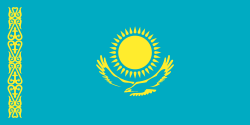Arys (řeka)
| Arys | |
|---|---|
 | |
| Základní informace | |
| Délka toku | 378 km |
| Plocha povodí | 14900 km² |
| Světadíl | Asie |
| Pramen | |
| Talaský Alatau a Karatau | |
| Ústí | |
| Syrdarja 42°47′0″ s. š., 68°14′0″ v. d. | |
| Protéká | |
| Úmoří, povodí | |
| bezodtoká oblast, Aralské jezero, Syrdarja | |
| Některá data mohou pocházet z datové položky. | |
Arys (rusky Арысь) je řeka v Turkestánské oblasti v Kazachstánu. Je 378 km dlouhá. Povodí má rozlohu 14 900 km².
Průběh toku
Pramení na svazích hřbetů Talaský Alatau a Karatau. Poté, co opustí hory teče rovinou. Na horním toku patří mezi řeky sněhovo-ledovcového původu. Největší přítoky jsou Mašat, Aksu, Sajramsu, Boraldaj, Badam. Je pravým přítokem Syrdarji.
Vodní stav
Průměrný roční průtok je 46,6 m³/s u města Arys. Maximální je v dubnu a minimální v srpnu. Na dolním toku je vodní režim řeky značně ovlivněn odebíráním vody na zavlažování.
Literatura
- V tomto článku byly použity informace z Velké sovětské encyklopedie, heslo „Арысь“.
Externí odkazy
 Obrázky, zvuky či videa k tématu Arys na Wikimedia Commons
Obrázky, zvuky či videa k tématu Arys na Wikimedia Commons
Média použitá na této stránce
This photograph is from the ethnographical part of Turkestan Album, a comprehensive visual survey of Central Asia undertaken after imperial Russia assumed control of the region in the 1860s. Commissioned by General Konstantin Petrovich von Kaufman (1818–82), the first governor-general of Russian Turkestan, the album is in four parts spanning six volumes: “Archaeological Part” (two volumes); “Ethnographic Part” (two volumes); “Trades Part” (one volume); and “Historical Part” (one volume). The principal compiler was Russian Orientalist Aleksandr L. Kun, who was assisted by Nikolai V. Bogaevskii. The album contains some 1,200 photographs, along with architectural plans, watercolor drawings, and maps. The “Ethnographic Part” includes 491 individual photographs on 163 plates. The photographs show individuals representing the different peoples of the region (Plates 1–33); daily life and rituals (Plates 34–91); and views of villages and cities, street vendors, and commercial activities (Plates 92–163).
Boats and boating; Ethnographic photographs; Ferries; Photographic surveys; Rivers; Turkic peoples

